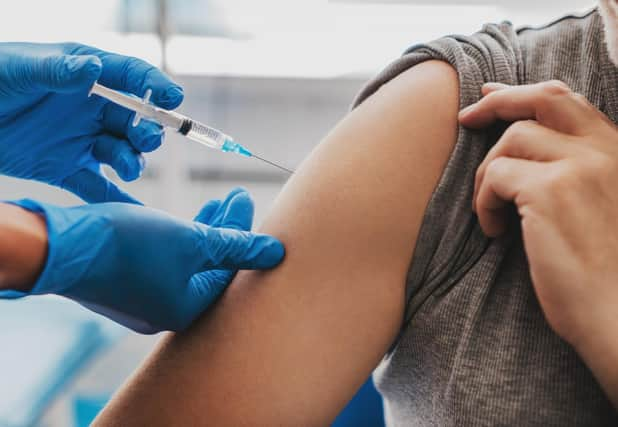GPs and their staff need to ensure time off ahead of likely busy winter


Dr Ciaran Mullan who works in the Riverside practice in Strabane and is also GP Associate Medical director with the Western Trust, believes that, in the long term, GPs and their practices must be central to any discussions on how we deal with the ongoing pressures faced by the NHS.
“We need to train and retain more GPs, particularly in the West, along with other primary care staff to keep pace with demand,” he told the ‘Journal’ in a wide-ranging interview focused on the impact of the Covid-19 pandemic on local doctors.
Advertisement
Hide AdAdvertisement
Hide Ad“We also need to work with each other and colleagues in the wider healthcare system in finding solutions to improve outpatient and surgery availability which is under even more pressure as a result of Covid. There also has to be significant investment in GP premises which have suffered from a lack of support and funding for so many years, the effect of which has been amplified during the pandemic.”


He adds: “Our workload and workforce issues need to be prioritised in order to safeguard the care we deliver for our patients.”
Dr Mullan acknowledges the steep learning curve faced by GPs as a result of the pandemic.
“The key challenges have included maintaining safe access for our patients who require it to providing the most appropriate healthcare staff in our practices. This has involved large scale reorganisation of appointments where patients have, firstly, a phone appointment for an initial assessment and, then, I can decide if they need further face to face assessment or if I need to arrange for investigations to be carried out or organise treatment.
Advertisement
Hide AdAdvertisement
Hide Ad“We also had to make changes in our practice premises to make sure it was Covid safe for all the staff working there. Our GPs have also been on a rota to cover our local primary care Covid centre since the start of the pandemic. This has been a challenge for the practice as, ultimately, it has been taking GPs out of surgery. However, we felt it was important, particularly at the start of the pandemic, to maintain practices for non-Covid patients who needed to be seen.”
In addition, says Dr Mullan, doctors have also been working hard delivering a flu and Covid 19 vaccination campaign as well as staying up to date with the ever-changing information on Covid-19 with regards to community restrictions, vaccination rollout and accessing healthcare in our hospitals.
So, just how busy has it been during the crisis?
“We were extremely busy before Covid and we are now as busy, if not more so, due to some of the challenges outlined previously,” he says. “Balancing the workload associated with phone consultations, the ongoing need for face to face assessments - whether in the practice or as home visits - arranging treatment/investigation or any required review or onward referral has been more difficult with the pandemic restrictions. General practice is by definition unpredictable and I and my practice colleagues have had to restructure our working days to allow as best we can the appropriate time for the numerous interventions we do to make sure we deliver the best possible care to our patients”.
Dr. Mullan says administrative staff are essential and invaluable members of the practice team and, without them, primary care would grind to a halt.
Advertisement
Hide AdAdvertisement
Hide Ad“They have had to go through all the challenges associated with the stresses of the Covid pandemic for themselves with their families, while having changes in their day to day working practices to ensure patients are given the right information about their care, appropriate access, when required, as well as maintaining key tasks to keep our practices running.
“Our administrative staff work closely with our practice managers, GPs, and our wider team to agreed protocols and are crucial in ensuring our patients get the most appropriate and timely care and advice. A lot of practices, including my own, now have various healthcare professionals available for patients, including mental health practitioners, social workers, first contact physiotherapists, pharmacists, treatment room and district nurses, as well as GPs. Our administrative staff are crucial in guiding the patient to the right professional. They are duty bound to maintain confidentiality in all their patient encounters in exactly the same way as our clinical staff are. They are among the unsung heroes of this pandemic.”
Dr Mullan says that, essentially, the average day “has our morning and afternoon split into slots for phone or virtual appointments and face to face appointments and time for administrative tasks.”
He added: “Each week, our practice carries out up to 450 phone appointments and up to 150 face to face appointments including house calls.
Advertisement
Hide AdAdvertisement
Hide Ad“We also have a GP on call throughout the day to deal with urgent patient queries, to see our sickest patients along with dealing with urgent treatment and administrative requests.
“Every week, we issue up to 1,400 prescriptions, we carry out or arrange and action up to 900 test results and deal with up to 500 communications received by post or electronically (mostly patient related communications e.g. correspondence from hospital clinics).
“Crucially, face to face appointments never stopped during the pandemic but the demand for these appointments has had to be managed to ensure they are safe and appropriate both for our patients and staff alike. The use of PPE is an ongoing requirement for all our face to face assessments and this is a further challenge in ensuring we provide care to the highest standard for our patients.”
Turning to the increase in mental health issues during the pandemic, Dr Mullan says: “It is very clear that there has been more stress in our community with all the significant restrictions of the pandemic and the illness, bereavement and suffering that has been endured as a direct or indirect result of Covid-19.
Advertisement
Hide AdAdvertisement
Hide Ad“There can be little doubt that it has highlighted how important simple things, such as healthy lifestyle, exercise, fulfilling employment and the ability to socially interact with friends and family, are in helping us to live well. I think the way communities have rallied to support our most vulnerable patients has been very heartening and the essential services for our patients with more severe mental health issues have continued to be there, though under very difficult circumstances. Again, phone consultations in our practice continue to be crucial in identifying patients with urgent and ongoing need with regards to their mental health and it has meant we have been able to provide the necessary support and treatment.”
Looking to the future, Dr Mullan says that embracing technology has been “mostly a positive thing for practices”.
“Being able to use video technology, text messaging and photography, where available, linked into our clinical systems have given us other options when dealing with patients when restrictions are in place. Our job is centred around the face to face consultation and this will still be a key aspect of our work in interacting with our patients - but having other options, when needed, for efficiency and safety has been important.
“There also has been positive feedback among GPs working in the Covid centres as they brought colleagues together providing a safe and effective assessment area for patients with symptoms in keeping with Covid-19 infection. This, along with the co-operative working involved in running a large number of flu and Covid vaccination clinics, have also been positives.”